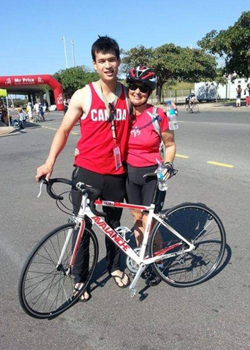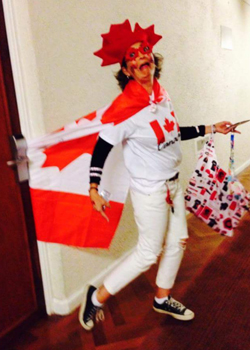‘Life is not a dress rehearsal’

By Ana Gajic

Melanie Assing (right) and her son.
Having a kidney transplant motivated Melanie Assing to do things she would have otherwise never done.
“It makes you realize that life is not a dress rehearsal,” she said.
In one example of trying new things post-transplant, Assing decided to participate in the World Transplant Games in South Africa in 2013. She set off with her son and wasn’t sure what to expect.
Since then, she’s participated in two World Transplant Games, and one set of Canadian Transplant Games.
The Canadian and World Transplant Games aim to celebrate successful transplant through unique and inspiring competitions. The Canadian Transplant Games take place every two years, with the next competition set to kick off in summer 2020. The World Transplant Games host summer competitions every two years, and winter competitions in the intervening years. The 2019 World Transplant Games will take place in August in the United Kingdom.
We connected with Assing to learn more about her involvement in the Games and what they’ve meant to her.
Q. How did you first find out about the Transplant Games?
I was sitting in the Transplant Clinic at St. Michael’s and there was a magazine in the waiting area. On the back of it there was an ad for what looked like the Calgary Stampede.
It turned out to be an ad for the Transplant Games that had taken place in Calgary. Then I went through a number of personal changes, which sort of triggered me to go for it. Life’s short, let’s go!
Q. Which sports did you compete in?
At different Games, I competed in different sports. I played volleyball for Canada in South Africa and competed in a 20-km cycling race, which was cool because it was up along the highway right along the Indian Ocean.
At the World Transplant Games in Argentina, I did bowling and table tennis. To my pleasant surprise, I won a couple medals in bowling, playing against women from other countries in my age category. I bowled as a kid, but I never thought I’d be in the running for a medal. I kept one of the medals for myself, and gave the other to my donor cousin.
The Transplant Games are wonderful because you don’t have to be a super athlete to compete – it is truly a network-building opportunity for anyone who’s had a transplant.

Q. What did you learn from the Games?
There were many lessons. At my first Transplant Games, I saw this amazing network of people – it seemed like every country was represented. I heard so many stories of survival and second chances. It was very uplifting. I’m sort of disappointed I didn’t get involved earlier.
I used to play basketball in high school, but that sport became harder for me after transplant. At the Games, I realized I could still play different sports. You kind of go through the joy of having a new transplant, but there is some grieving to it because it’s like a loss of an old way of life. It was inspiring to see that there is lots I could still do.
Q. How have the Games impacted your transplant experience?
Until you connect with this community of transplant recipients, if you don’t know anybody who’s had a transplant, you don’t even know about this special group of people. Now that I have this network, I continue to be part of it past the Games.
For example, I’m part of the dragon boat Transplant team in Toronto. It expands your community and you get kind of a support group.
Q. What is one of your favourite memories from your trips to the Games?
In South Africa, my son and I dove with the great white sharks. I always dreamed of doing that when I was younger because I liked sharks. But I never thought I would do it. Having a transplant propels you – you feel like you don’t have time to waste and you can do the things you wanted to.
My transplant propelled me to go back to school and become a principal, to travel for the Games, and live as fully as I can.
Melanie Assing is the eighth in a series of patients we’re profiling to celebrate our Kidney Transplant Program’s 50th anniversary. It’s called #MyTXanniversary, and we want to encourage more people to register as organ donors and highlight its patients and staff by sharing stories of their own transplant anniversaries. Past articles:
- ‘A chance to live again’: one patient’s journey to transplant
- ‘I had nothing to lose’: St. Michael’s patient reflects on 42 years with kidney transplant
- A patient’s journey from dialysis at St. Joseph’s to transplant at St. Michael’s
- ‘The Gift’
- One man’s journey made possible by only hospital in Canada to offer rare procedure
- ‘Nothing more meaningful that we can give’: a mom donates her kidney to her son
- Half a century of success for the Kidney Transplant Program
- Sign up to be a donor, or check your registration status online today at our donor drive.
About St. Michael’s Hospital
St. Michael’s Hospital provides compassionate care to all who enter its doors. The hospital also provides outstanding medical education to future health care professionals in more than 27 academic disciplines. Critical care and trauma, heart disease, neurosurgery, diabetes, cancer care, care of the homeless and global health are among the Hospital’s recognized areas of expertise. Through the Keenan Research Centre and the Li Ka Shing International Healthcare Education Centre, which make up the Li Ka Shing Knowledge Institute, research and education at St. Michael’s Hospital are recognized and make an impact around the world. Founded in 1892, the hospital is fully affiliated with the University of Toronto.
About Unity Health Toronto
Unity Health Toronto, comprised of Providence Healthcare, St. Joseph’s Health Centre and St. Michael’s Hospital, works to advance the health of everyone in our urban communities and beyond. Our health network serves patients, residents and clients across the full spectrum of care, spanning primary care, secondary community care, tertiary and quaternary care services to post-acute through rehabilitation, palliative care and long-term care, while investing in world-class research and education. For more information, visit www.unityhealth.to.
